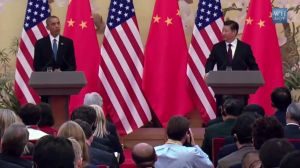 On Nov. 11, U.S. President Barack Obama and Chinese President Xi Jinping made a historic U.S.-China Joint Announcement on Climate Change outlining each country’s commitment to strengthen bilateral cooperation on climate change and to announce post-2020 actions in support of the effort to transition to low-carbon economies.
On Nov. 11, U.S. President Barack Obama and Chinese President Xi Jinping made a historic U.S.-China Joint Announcement on Climate Change outlining each country’s commitment to strengthen bilateral cooperation on climate change and to announce post-2020 actions in support of the effort to transition to low-carbon economies.
Regarding China’s announced target of peaking of carbon dioxide (CO2) emissions around 2030, Lynn Price, Leader of the China Energy Group at Lawrence Berkeley National Laboratory (Berkeley Lab), said: “When we compare China’s 2030 target to the results of a number of recent or ongoing studies of China’s energy and emissions pathways to 2050, this appears to be a relatively ambitious date to achieve a CO2 emissions peak and implies a meaningful effort beyond business-as-usual. An important consideration, though, is the level of CO2 emissions when the peak occurs, which was not included in China’s announcement. Current studies show a range of 12 to 15 GtCO2 (gigatons CO2) between 2038 and 2040 in the baseline scenarios and a range of 10 to 11 GtCO2 between 2025 and 2030 in the ambitious scenarios.”
Regarding China’s pledge to increase the non-fossil fuel share of all energy to around 20 percent by 2030, Nan Zhou, Deputy Group Leader of the China Energy Group, said: ”A number of recent studies show a 20 percent share to be achievable in their continuous effort scenarios, while the more ambitious scenarios indicate a possible a range of 25 to 30 percent non-fossil energy sources by 2030. The Chinese goal of 20 percent most likely reflects caution about the aggressive nuclear growth implied in the non-fossil target as well as issues with accommodation of a large share of renewable resources in China’s electric grid.”
In 2011, Berkeley Lab’s China Energy Group published one of the first studies to foresee a peak in China’s CO2 emissions, China’s Energy and Carbon Emissions Outlook to 2050. The Group is currently participating in new 2050 study in collaboration with China’s Energy Research Institute, the Rocky Mountain Institute, and Energy Foundation China. Results of that study, called Reinventing Fire: China, will be released in April 2015.